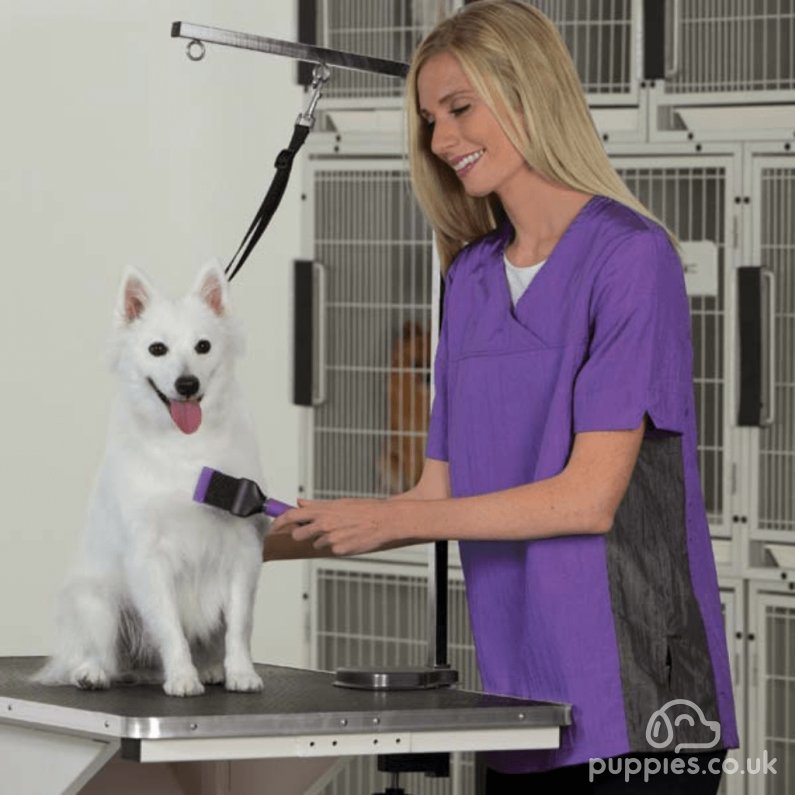Fleas on Puppies? Need to Know for Dogs & Blood-sucking Pests

Sometimes, no matter how careful you are, how often you groom, your dog gets fleas. Whether it’s from a walk in the park or from a random dog on the street, fleas are a common problem for our furry friends.
The important thing is to catch the problem on time and take adequate and immediate actions to deal with such parasites!
How to tell if your dog has fleas?
You must be familiar with your pet’s behaviour so seeing anything that is out of the ordinary or your dog looking ill, is a sign to check up on your furry friend. There are several distinct ways which we list below that can help you determine with certainty if the problem is with fleas.
Dog fleas symptoms:
- Excessive scratching and biting;
- Red skin or wounds from scratching and biting;
- Secondary infection;
- Rash or bad patches;
- Seeing flea dirt and live fleas on your dog;
Dog fleas treatment
Even though it may sound like a cliché, there are some tested and proven natural methods to deal with fleas and also ticks on pets that are very efficient.
We list these for the sake of having a pest control specialist who also says that these methods can work.
- Flea combs: there's a variety of flea combs in most pets shops, most of the work. It could be the cheapest ones that aren't helpful but overall, the combs can help a lot when you want to clear fleas from your beloved pet.
- Flea shampoos: bathing your furry little friend with one can greatly reduce the number of fleas on the pet. Bathe the pet as often as necessary, or as often as it says on the label.
- Flea and tick collars can also help, however, for cats who are often let free to run around it is not recommended. They tend to go through narrow holes and can get stuck because of their collars. So if you have a cat that’s affected by the fleas be careful.
- Use essential oils that repel ticks and fleas. Two-three drops can be added on their collars, shampoo, or the pet's back (this must be done very carefully and preferably after a discussion with the vet). Some oils that can be used are lemongrass, peppermint, cedar, garlic.
If you have a puppy or a pregnant dog, you must call your vet as soon as possible and not attempt to treat the animal on your own because you may do something wrong. Your vet will be able to recommend you other methods which would be more suitable for your dog, like:
- Food and drinks;
- Oral tablets;
- Sachets;
- Medical shampoo or spray;
- More.
Also, do not forget to treat the dog’s bedding or/and house, remind us professional blood-sucking insect exterminators Fantastic Pest Control. If the fleas have spread in your home, treat the entire property as well.
Otherwise getting your dog clean with a bath that kills the fleas won’t solve the problem.
How to get rid of fleas on a pregnant dog?
If your dog is pregnant, of course, you mustn’t use the same treatment as for a non-pregnant dog. Probably the best thing to do in such a case is prevention. Treating the area of your dog’s bedding, your home and your garden with flea repellent so you can avoid such a problem overall.
But if the mother-to-be already has fleas, a safer treatment would be a bath with flea shampoo and a comb can help.
However, make sure the shampoo isn’t the strongest. You can also consult with the vet about what shampoo you should use. You may even use Dawn dish soap instead of flea shampoo. You’ll probably need to wait a bit longer after you shampoo the dog so the soap can kill the fleas, but it will work.
The third option to treat a pregnant dog for fleas is a topical flea medication. This type of medicine is applied on the shoulders of the dog so it doesn’t lick it off. We recommend that you talk to your vet before buying a product.
How to get rid of fleas on small dogs and puppies?
Young puppies that are still with the mother are usually protected from the mother’s treatment or collar. You shouldn’t apply any flea products on newborn puppies.
Once the puppies are weaned and are over 7 weeks old, you can speak to a vet about appropriate flea treatments.
Treating small dog breeds for fleas is allowed, only the proportions of certain medications, especially oral ones, must be calculated accordingly to the dog’s size and kilograms.
Internal infections from fleas
Fleas can cause other health problems to your pet, regardless if they are a small or a large breed. So what are the dangers fleas pose to your dog?
- Fleas can transmit tapeworms to your pet. The symptoms can be an itchy rear end, weight loss, change in behaviour. Tapeworms are easily treated by vets, so as soon as you spot the symptoms, call them and take your dog for an examination.
- Anaemia is another issue which is most common in puppies than in older dogs. Also, it is more likely to occur if the flea infestation is heavy and continues for a long time. This happens when the fleas feed too much on the puppies that their blood cell count changes. When the blood cell count decreases the dogs become anaemic. This can be a dangerous condition if untreated. That’s why it’s important to take measures against fleas as soon as you see them.
Frequently asked questions about dog fleas
Can dog fleas bite humans?
They can and they will. What they cannot do, however, is live on you as they do on dogs and cats. Your body doesn’t provide the ideal environment for them to live and breed on. Fleas thrive in thick fur which your pet has. That being said, if the infestation grows in your home, they will bite humans, too.
Are cat and dog fleas the same?
No, they are different.
However, they can only be distinguished under a microscope. What is more, both cat and dog fleas can live on other animals. Cat fleas can live on dogs, and dog fleas on cats. Also, both species can live on other animals.
Do dog fleas die in winter?
The life-cycle of fleas slows down in temperatures lower than 23.8 degrees Celsius. Regardless of the stage, they are in, they can survive for a couple of weeks in low temperatures. However, in no life stage will they survive nearly freezing temperatures.
That being said if the fleas can find a place to overwinter they will live through it. Places, where fleas can hide from the cold, are a warm-blooded host, carpets, bedding, etc. So it’s always advised to change or upkeep winter dog coats neat and clean.
How long can dog fleas live without a host?
Adult fleas can live up to a week without feeding on a host. If they are newly turned adults and have not yet fed on blood, they may live up to two weeks. If they live near the host for example on their bed, they can live longer.
Takeaways
To sum up, we can say that all of the above-listed methods of dealing with dog fleas are safe for your pet and yourself. It’s important to pay attention to changes in your dog’s behaviour and catch the flea problem on time. The sooner you begin treatment, the faster and painless it would be to get rid of the parasites.
If you are worried that your dog may be allergic to some of the natural remedies in this article, call a vet immediately











